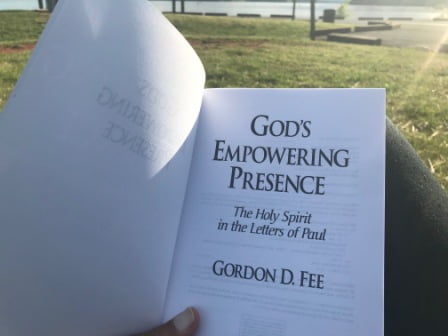Saturday, May 30
7:35 AM “Why? Why me? Why this?” Ah, the questions we ask when we are suffering. But God has the answer to each. Notice the three occurrences of “so that” in 2 Cor. 1:3-11 (NASB):
Verse 4: ” … so that we are able to comfort those who are in any affliction with the comfort with which we ourselves have been comforted by God.”
Verse 9: ” … so that we would not trust in ourselves, but in God who raises the dead.”
Verse 11: ” … so that thanks may be given by many persons on our behalf for the favor bestowed on us through the prayers of many.
As usual, Paul combines simplicity and depth. When we invite God into our world of suffering, he walks right in. He brings a host of gifts — resilience, hope, patience, joy — but also understanding. He wraps us in his arms and says, “My dear child, here is why I allow you to suffer affliction. That you might be prepared to comfort others. That you might not trust in yourself. And that you might learn to give thanks in everything.”
Simple? Yes. Easy? No. If we are suffering, this is a time to examine ourselves, as Paul suggested in 1 Cor. 11:28. In the first place, suffering brings us closer to reflecting God’s own empathy. Who best knows how to comfort a man who’s lost his wife than someone who has lost his own? Who better knows how to comfort a couple who has lost their infant child than another couple who has lost a baby? Who understands cancer better than someone with cancer? Think of dominos bumping against each other: God comforts us, we comfort others, they comfort still others, and the domino effect goes on and on.
Then too, when we suffer we’re forced to look up. We abandon reliance on ourselves and become utterly dependent on God alone. We have to surrender. We have to give in. And when we do, God wonderfully comforts us. “I’m right here,” he says. “I never left. Just lean on me. Let me comfort you. The One who pulled off the resurrection will see you through.” He may not bring back the wife or baby you lost, but he will being back your soul, your hope.
Finally, maybe it’s time we gave thanks for the situation we find ourselves in. To be honest, it took me years to give thanks after Becky’s passing. Years. No one and nothing could bring thanksgiving out of my mouth. Finally, God brought it out. The silence had lingered for 5 years. Four Christmases had come and gone. Then one day, it was like a light broke into my life. Finally I was able to say, “Thank you, Lord, for what you have taught me in the midst of all this pain. I would never have gotten so close to you. In the mystery of your will, it’s not only what you give us but what you take that is a vital part of the plan. You lovingly and sovereignly rule over me, shaping me into the image of your Son. Thank you for your comfort, your grace, your mercies. Thank you.”
The three lessons of suffering?
- Empathy.
- Humility.
- Gratitude.
We aren’t victims of circumstance. In fact, the very suffering that Satan intends for evil, God intends for good.
Believe that today.
(From Dave Black Online. Used by permission. David Alan Black is author of a number of Energion titles including Running My Race and The Jesus Paradigm.)















